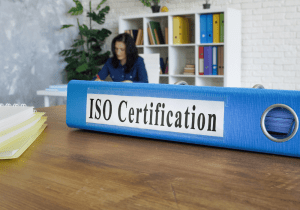When it comes to manufacturing high-tolerance parts for Original Equipment Manufacturers (OEMs), precision and reliability are not just desirable—they’re essential. ISO-certified custom metal fabrication services set the gold standard for quality, consistency, and credibility in the industry. By adhering to stringent international guidelines, ISO-certified facilities deliver parts that meet exact specifications while exceeding client expectations. This blog explores the significance of ISO certification in custom metal fabrication and why it matters so much for OEMs producing high-tolerance components.
What Does ISO Certification Mean in Custom Metal Fabrication?
 ISO certification verifies that a company adheres to international standards of quality, safety, and efficiency in its operations. For metal fabrication shops, this credential ensures that processes—from material sourcing to manufacturing and inspection—comply with best practices designed to deliver consistent, high-quality results.
ISO certification verifies that a company adheres to international standards of quality, safety, and efficiency in its operations. For metal fabrication shops, this credential ensures that processes—from material sourcing to manufacturing and inspection—comply with best practices designed to deliver consistent, high-quality results.
For custom metal fabrication, ISO certifications (such as ISO 9001) demonstrate the company’s systematic approach to quality management. This means that every stage of the fabrication process follows a precise, documented protocol aimed at minimizing errors and maximizing performance. Whether it’s cutting, welding, or finishing, manufacturers employ rigorous standards, ensuring that production aligns consistently with customer requirements.
This level of oversight is crucial for OEMs requiring high-tolerance parts, as even the smallest deviation in fabrication could compromise the final product’s functionality. ISO-certified fabricators reduce risks by validating their processes through routine audits, making them a reliable choice for precision manufacturing.
ISO certification also positions a fabricator as capable of meeting global benchmarks for quality. For companies operating across borders or serving international markets, this certification establishes reliability and trustworthiness. It signals to clients that the manufacturer operates with transparency and complies with universally recognized protocols.
How ISO Certification Impacts High-Tolerance Parts Production
OEMs often demand tight tolerances, requiring parts that meet exact dimensions with little room for variation. Here’s how ISO-certified custom metal fabrication makes a meaningful difference in manufacturing such critical components.
Maintaining Precision and Repeatability
Precision is the backbone of high-tolerance parts production, and ISO standards foster repeatability across manufacturing runs. ISO-certified fabricators leverage advanced equipment and expertise to adhere to precise specifications, ensuring each part matches blueprints without deviation.
For instance, CNC machines used by ISO-certified shops are regularly calibrated to maintain exact standards. Operators follow documented procedures for machining, assembly, and inspection, leaving no room for human error. The result is a production line capable of producing thousands of uniform components with the same impeccable accuracy.
Without ISO certification, the variability in processes and outcomes could lead to flawed parts, increasing the likelihood of production delays and rework. For industries like aerospace or medical manufacturing, the cost of failure is simply too high to risk working with uncertified facilities.
Ensuring Material and Process Traceability
Traceability is another critical aspect for OEMs, especially in industries requiring high-tolerance or safety-critical parts. ISO-certified custom metal fabrication ensures documented records of raw materials, machining processes, and inspection data. This level of traceability allows OEMs to verify compliance with industry standards and local regulations.
Traceability not only adds accountability but also supports troubleshooting if a defect arises. By maintaining detailed records, ISO-certified shops can identify the source of the problem quickly, minimizing potential downtime or product recalls.
Mitigating Risks Through Rigorous Quality Control
 The rigorous quality control protocols of ISO-certified facilities help OEMs avoid costly risks associated with defective components or inconsistent quality. Every aspect of production is carefully monitored, reducing the potential for errors that could affect the performance of the final product.
The rigorous quality control protocols of ISO-certified facilities help OEMs avoid costly risks associated with defective components or inconsistent quality. Every aspect of production is carefully monitored, reducing the potential for errors that could affect the performance of the final product.
Inspection is a key pillar of ISO-certified custom metal fabrication. Many ISO-certified manufacturers integrate multiple stages of in-process and final inspections to ensure quality at every step. Advanced tools such as coordinate measuring machines (CMMs), laser scanners, and X-ray systems are commonly used to inspect parts for dimensional accuracy and structural integrity.
For OEMs producing high-tolerance parts, these inspections are invaluable. They verify that specifications are met before components are shipped, eliminating the need for secondary inspections upon receipt. Furthermore, ISO-certified manufacturers undergo external audits to maintain their certification, holding them accountable to their high standards.
By maintaining stringent quality control measures, ISO-certified fabricators minimize production downtime related to defective parts or equipment failure. Fewer defects mean fewer bottlenecks and interruptions, giving OEMs greater confidence in their supply chain. This reliability is particularly significant for high-volume needs or urgent projects that leave no room for delays.
Enhancing Cost Efficiency and Long-Term Value
While ISO-certified custom metal fabrication may seem like a premium service upfront, it offers significant long-term value and cost efficiency for OEMs. Certification ensures streamlined processes and reduced waste, which trickle down to clients in meaningful ways.
ISO standards stress efficient use of materials and proactive defect prevention. By using best-in-class equipment and proactive processes, certified shops drastically reduce scrap material and costly rework. This not only saves money but also protects supply chain timelines.
For OEMs working with expensive raw materials like titanium or high-grade aluminum, this efficiency becomes particularly critical. Eliminating material waste can result in substantial savings over time while delivering consistently high-quality outcomes.
Choosing an ISO-certified custom metal fabricator enables OEMs to establish long-term partnerships with a trusted supplier. The consistent performance of certified fabricators reduces the need to switch suppliers, ensuring a steady stream of reliable components. Strong partnerships also pave the way for advanced collaborations, like co-developing solutions for new products, improving future innovations, and optimizing supply chain strategies.
Why OEMs Should Insist on ISO-Certified Fabricators
For industries such as automotive, aerospace, medical, and defence, working with ISO-certified custom metal fabricators isn’t just a preference—it’s a necessity. These sectors demand exceptional precision, uncompromising safety, and reliable repeatability, all of which ISO certification guarantees.
Choosing uncertified fabricators introduces risks, such as inconsistent quality, increased liability, and potential regulatory issues. Conversely, an ISO-certified partner ensures accountability, efficient communication, and above all, consistently superior results.
Custom metal fabrication plays a pivotal role in the production of high-tolerance parts, and ISO certification elevates its reliability and precision. From rigorous quality control to material traceability and process efficiency, ISO-certified shops deliver unmatched value for OEMs operating in demanding industries. By prioritizing certification in their selection criteria, OEMs can ensure their projects are completed to the highest standards while minimizing risk and maximizing long-term success.
